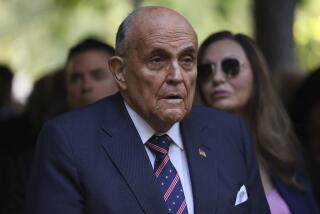Arkansas Panel Moves to Disbar Clinton
- Share via
WASHINGTON — An Arkansas state court panel sued President Clinton on Friday in an effort to strip him of his law license, charging that his dishonesty about his relationship with Monica S. Lewinsky damaged the legal profession and demonstrated his “overall unfitness” to practice law.
Clinton’s private attorney immediately vowed to fight.
“We fundamentally disagree with the complaint filed today and will defend vigorously against it,” David E. Kendall said in a one-line statement released by the White House.
The president has 30 days to respond to the lawsuit in court. But whether Clinton wins or loses the battle, Friday’s developments could focus renewed attention on a scandal that the president hoped to put behind him months ago.
The disbarment complaint filed Friday by the Arkansas Supreme Court’s Committee on Professional Conduct, adopting a recommendation made last month by a court advisory panel, marks an unprecedented action against a sitting president. And it reveals some of the Arkansas panel’s reasoning for moving to have Clinton disbarred.
In its five-page filing in Pulaski County Circuit Court, the committee used strong language to condemn Clinton for his “serious misconduct” in allegedly using “dishonesty, deceit, fraud and misrepresentation” to hide his affair with Lewinsky.
Clinton’s conduct, driven by “a desire to protect himself from the embarrassment” of his illicit relationship, “damages the legal profession and demonstrates a lack of overall fitness to hold a license to practice law,” the committee said in its filing, which also included dozens of pages of exhibits and partial transcripts.
The complaint grows out of a decision last year by a federal judge in Arkansas who found Clinton in contempt of court and fined him $90,000 for his “misleading statements” about the Lewinsky affair.
U.S. District Judge Susan Webber Wright found that Clinton effectively obstructed justice when he testified under oath in a January 1998 deposition in a lawsuit brought by Paula Corbin Jones, giving false and misleading answers when asked if he had ever been alone with Lewinsky or engaged in sexual relations with the former White House intern.
Allegations that Clinton’s denials amounted to perjury also led to his impeachment by the House, but he was acquitted by the Senate in February 1999. An independent counsel investigation into the Lewinsky matter, initiated by Kenneth W. Starr and handed over in October to his successor, Robert W. Ray, remains open.
The complaint for disbarment is now expected to go before Circuit Court Judge John Ward, who was a state representative while Clinton was governor. If the judge decides that Clinton should be disbarred, legal observers expect that the matter will wind up before the Arkansas Supreme Court.
Clinton practiced law only sporadically after receiving his law degree from Yale University in 1973. He was a law professor at the University of Arkansas but then won election as state attorney general in 1976 before serving as governor and then president.
“The great irony here is that no one expects the president to ever practice as a lawyer,” said George Washington University law professor Jonathan Turley, who testified against Clinton during the impeachment proceedings.
“But for the president this remains a highly symbolic issue. The president won’t give up the ghost on this because it carries such symbolism and because he does not want to be compared to Richard Nixon,” Turley said.
Nixon voluntarily gave up his law licenses in California and New York rather than face disbarment after he resigned the presidency in disgrace in August 1974.
More to Read
Sign up for Essential California
The most important California stories and recommendations in your inbox every morning.
You may occasionally receive promotional content from the Los Angeles Times.













